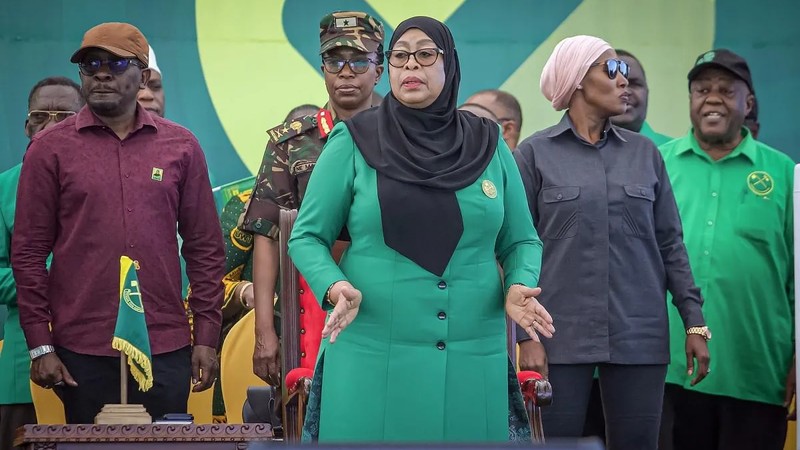The Southern African Development Community (SADC) Election Observer Mission (SEOM) has declared that Tanzania’s 2025 general election failed to meet its standards for a credible, free and fair vote.
Delivering the preliminary statement in Dodoma on Monday, former Malawi Speaker of Parliament Richard Msowoya, who led the mission, said the polls “fell short of the requirements of the SADC Principles and Guidelines Governing Democratic Elections.”
The election was conducted over two days: security forces voted on October 28 2025, in Zanzibar, and the rest of the electorate voted on October 29, 2025.
Msowoya said observers encountered “challenges in consulting with key stakeholders, particularly the Independent National Electoral Commission (INEC), as they had not been issued with Introduction Letters together with Accreditation Identification Cards as required by the law.”
He noted that “some INEC officials required the said Introduction Letters before consultations with the SEOM observers, but other officials did not make such a requirement.”
He added that “some stakeholders were reluctant to share information with the observers and often referred them to the Ministry of Foreign Affairs and East African Cooperation.”
In Tanga Town, “observers were subjected to aggressive interrogation by the security forces, had their official documents, including their passports, seized, though later returned, and were forced to delete mission-related photographs from their official gadgets.”
The mission observed that the country was largely calm during the pre-election period and most of election day, “save for isolated incidents towards the closure of the voting.”
However, some stakeholders cautioned that “the general calm and peace belies covert acts of general intimidation of the population and opposition political parties and candidates.”
“These stakeholders cited the alleged abductions of some political activists,” Msowoya said.
“The stakeholders highlighted the arrest of members of the opposition, notably the detention and trial of Tundu Lissu, the leader of the main opposition party, Chama cha Demokrasia na Maendeleo (CHADEMA), on treason charges.”
He said “the disqualification of some opposition candidates, particularly of Mr. Luhaga Mpina of ACT-Wazalendo also raised questions about the fairness of the electoral landscape.”
Some viewed the arrests and disqualifications as “undermining the URT’s multi-party system by removing legitimate competition in the electoral process,” creating “an uneven political playing field” and discouraging voter turnout.
The elections were overseen by the INEC and the Zanzibar Electoral Commission (ZEC).
Msowoya said most stakeholders agreed that the bodies were “adequately prepared to conduct the 2025 elections,” and voter registration was conducted in phases.
Out of a total population of 61.7 million, the commission registered 37.6 million voters – a 26.5% increase from 2020 – with women making up 50.31% of registrants.
However, “some stakeholders expressed concern that there had not been any comprehensive electoral law reforms since the last elections,” while others acknowledged some progress.
The mission pointed to constitutional provisions that limit electoral justice, such as Article 41(7), which “effectively bars any court from entertaining any challenge against the results of a presidential election.”
Msowoya said this “is contrary to the expectation of electoral justice as envisaged by Article 4.1.5 of the SADC Principles and Guidelines Governing Democratic Elections.”
He also noted that Articles 39, 67 and 77 restrict independent candidates, limiting “the individual’s freedom of association.”
Some stakeholders questioned “the Commission’s independence given that its members are appointed by the President, who is also chairperson of the ruling party and a presidential candidate.”
Concerns were also raised over early voting for security personnel in Zanzibar, with some viewing it as a “potential risk for electoral fraud.”
The mission noted that only three of the 17 presidential candidates were women.
Stakeholders cited “persistent barriers to meaningful participation of women and youth, including limited campaign financing and logistics, leadership training and mentorship opportunities, internal nomination processes within parties, and enduring patriarchal norms.”
“Cultural attitudes also hinder the participation of the youth,” Msowoya said.
He added that “in some rural areas, when youth show interest in participating in elections, the elderly express their preference for married people as opposed to single youth.”
The SEOM found that 49,174 registered voters were persons with disabilities.
Youth and women-led organisations played an active role in voter education through radio, television, music and community-based initiatives, though “concerns were raised about reduced funding for voter and civic education” and delays in accreditation.
The mission also noted “increasing covert and overt limitations on the right to freedom of expression” and “heavy censorship of online information platforms.” Some social media platforms were inaccessible during the vote.
On election day, SEOM observed polling in 27 regions.
“The Mission was able to observe the opening of polls in some polling stations but could not generate all data relating to opening and voting processes as a result of an internet outage around midday,” Msowoya said.
Due to protests and connectivity issues, “the mission could not observe the closing and counting processes in most of the areas.”
Despite the challenges, the SEOM noted that “70% of the polling stations and their surroundings were free of campaign materials,” and “93% of the polling stations observed opened on time.”
The voters’ register was displayed in most polling stations, and “the presence of police was observed at 96%,” with most officers unarmed.
However, the Mission noted a very low voter turnout in all polling stations observed, and some polling centres did not have voters at all.
“In some polling stations observed, there were multiple orderly stacked ballots in the ballot box during voting, which created a perception of ballot stuffing,” Msowoya added.
Domestic observers were largely absent, he said.
“In view of the Mission observations as detailed above, and mindful of the preliminary nature of this statement, it is the SEOM’s tentative conclusion that, in most areas, voters could not express their democratic will.”
“Overall, the 2025 General Election in the United Republic of Tanzania fell short of the requirements of the SADC Principles and Guidelines Governing Democratic Elections.”
The mission urged Tanzanians to “channel their concerns through established legal procedures and processes and not resort to violence or threats thereof.”
